Rubyconf 2016: The Performance Update

Post-conference haze
Woo! I just got back from RubyConf. It was a great conference (as usual), and so nice to meet a few of you, my readers, there. I’ve got a lot to report on the performance front, so let’s jump right in.
JRuby+Truffle

Chris Seaton
JRuby+Truffle member Chris Seaton presented an excellent talk on the problem with C-extensions in Ruby and what he (and other Ruby implementations) are doing about it.
JRuby+Truffle is a research project, sponsored by Oracle, which combines JRuby with the Graal and Truffle projects. It’s sort of an alternative to the alternative Ruby implementation (JRuby). Though it runs on the JVM, like JRuby, it uses the Truffle language framework to give itself nearly automatic just-in-time compilation and a host of other optimizations. It’s a lot further behind than JRuby in terms of compatibility, but it’s getting there.
C-extensions have always been a problem for alternative Ruby implementations because Ruby’s C API was never clearly defined, so C-extensions essentially just accessed the private internals of MRI. This meant that other Ruby implementations like JRuby had to pretend they were actually MRI to get C-extensions to work.
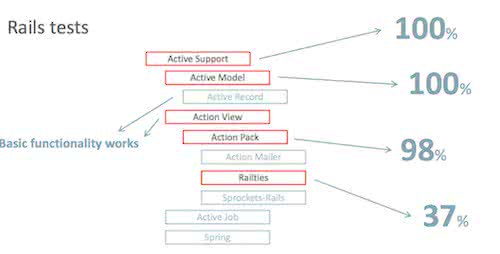
From Chris’ slides. JRuby+Truffle progress on Rails tests.
I learned alot about the JRuby+Truffle project from Chris’ talk, and, if it can achieve greater compatibility with Rails, it could be an amazing alternative implementation. Interestingly, JRuby+Truffle is actually the largest paid Ruby implementation team, with more paid developers than even MRI! They’re most of the way to running Rails applications, but C-extensions (especially Nokogiri and OpenSSL) remain the main stumbling block. Chris said that almost 25% of all lines of code in Rubygems are actually C-extensions - ouch!
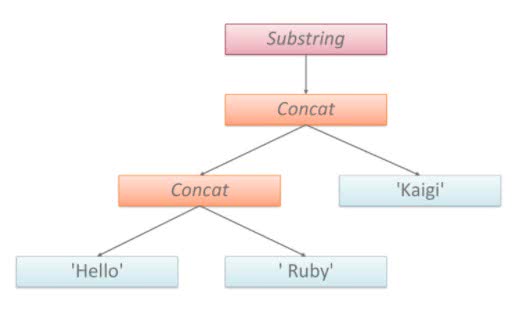
A “rope” style string representation
A lot of the things that the project does are really radical: see this talk from Kevin Menard about how JRuby+Truffle represents strings as ropes, which no other Ruby implementation does. In addition, because of the way the Graal compiler works in combination with the Sulong interpreter, JRuby+Truffle can optimize C code and Ruby code together, and at the same time. That is, from the compilers perspective, both Ruby and C code are identical. That’s powerful stuff! All of this means that, on some specific, limited benchmarks, JRuby+Truffle can be 30-100x faster than MRI!
Upcoming Changes to CRuby
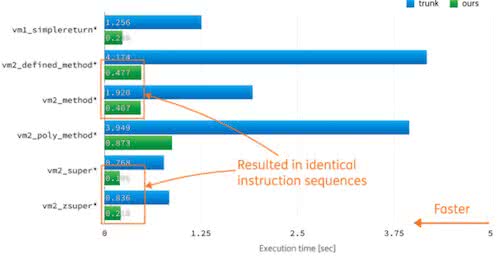
Shyouhei’s slides showed impressive benchmarks.
Shyouhei Urabe gave a talk about a de-optimizing engine for CRuby. Basically, compilers can optimize VM instructions when certain assumptions are made - for example, we can speed up “2 + 2” if we know “+” is not overridden. To make those optimizations, though, we also need to de-optimize if someone does override the “+” operator. JRuby has been doing this for a long time now, but we’ve never had anything of the sort in CRuby.
So, since basically anything can be overridden in Ruby, a de-optimizer is actually required before we can start on any optimizations. Shyouhei has proposed one - the details are pretty technical, but you can read more about it here. He showed that in the worst case, it makes a Rails app about 5% slower and uses no additional memory. Of course, the Rails app will be faster (and probably use more memory) once the optimizations are built on top of the de-optimizer.
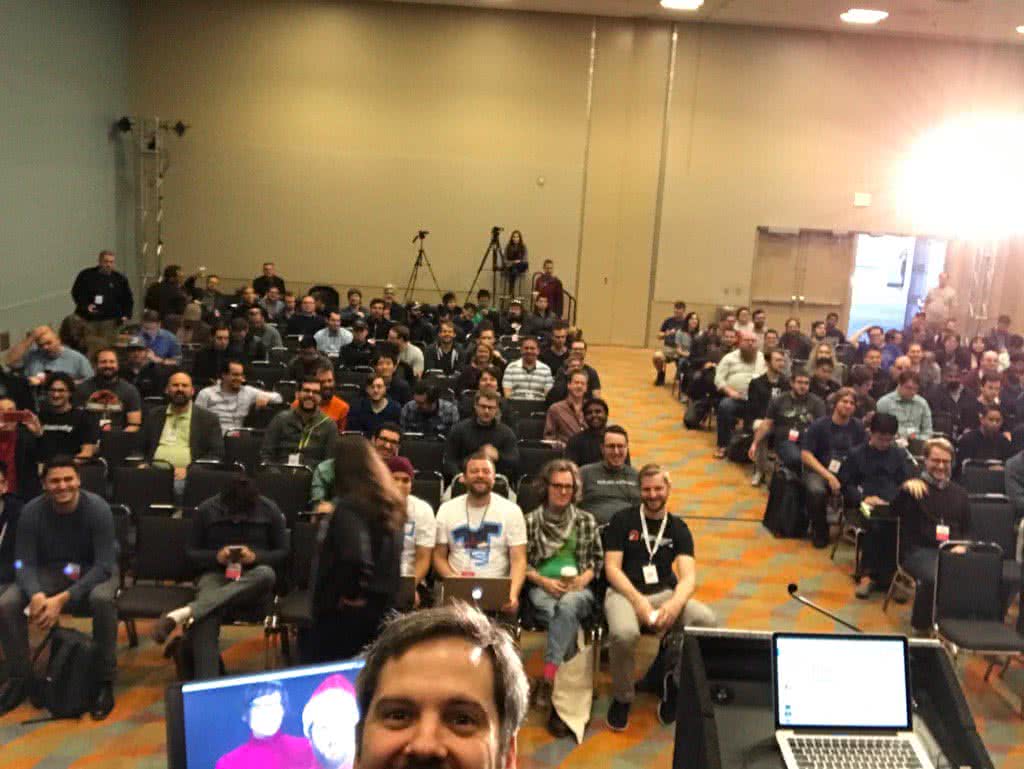
Aaron cheated at #rubyfriends.
Aaron Patterson gave a great overview of garbage collection and memory management in Ruby as a prelude to his optimizations for Ruby’s heap structure. Basically, we can improve copy-on-write performance and total RSS usage if we allocate objects into two separate areas - probably old (objects which won’t be GC’d, like Classes, Modules, etc) and probably new (everything else). RSS usage on Github improved by about 10%. You can see his PR to Github’s Ruby fork here.
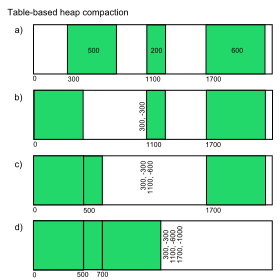
Read more about heap compaction on Wikipedia.
In addition, there was some hallway discussion about a compacting garbage collector for CRuby. This would be a very big deal for total memory usage. Previously, Ruby hasn’t had a compacting GC because C-extensions can hold memory addresses directly to Ruby objects - moving the object in memory would cause a segfault. However, Ruby 2.1 introduced “sunny/shady” objects - sunny objects have never been accessed by C-extensions, vice versa for shady objects. CRuby could move sunny objects around the heap to optimize total memory usage. Aaron Patterson has said on Twitter that he’s experimenting with it now, and it looks like he’s making great progress.
Matz clarified the goal of Ruby3x3 (making Ruby “3 times faster”). One of the main ways the core team are measuring that progress is through the optcarrot benchmark. Ruby 3 should run the optcarrot benchmark 3 times faster than Ruby 2.0.
Everything Else

Another reason to look forward to the next Summer Olympics.
Don’t look for true static typing in Ruby anytime soon. Matz said that he thinks type annotations aren’t DRY and aren’t human-friendly. He did say he liked Crystal though! Instead, Matz re-iterated his proposal for “soft” or “inferred” types in Ruby - if the compiler can tell that you’re going to call to_s on an object that doesn’t define that method, it will throw an error. Look for this in Ruby 3 (which Matz has said has a target release date of “before the Tokyo Olympics in 2020”).
I gave a talk on reducing memory usage in Ruby applications. You can see the slides and notes here. If you purchased the Complete Guide to Rails Performance, there’s probably not much new there to you, but if you haven’t, go buy it!

Evan Phoenix has added myself and Richard Schneeman (of Heroku) to Puma. We’re going to try to reduce the issue/PR backlog, but do send us more bug reports if you’re having trouble with Puma!

It’s hard to read, I know, but Koichi’s shirt really does say “Kill Threads”.
One interesting aspect of the conference was how much the Ruby core team (Matz and Koichi, mostly) were hostile to Threads. Matz said in his opening keynote that in retrospect, he wished he had never added Thread to Ruby. It seemed like, from a language designer’s perspective, he thought it was a poor abstraction and was too difficult to use. Koichi even wore a “Kill Threads!” shirt while presenting about Guilds, the new proposed Ruby concurrency model.
Speaking of Guilds, Koichi discussed some more details around the proposed model. GC will remain global and will not be per-Guild. Overhead for creating a new Guild should be extremely low - akin to creating a new Thread. Transferring big objects (like huge Hashes) between Guilds will probably require a new datastructure, like “BigHash” or “BigArray”. Feedback has been very positive to Guilds so far, and many believe it could be just what we need. It seems like we should see Guilds in Ruby some time prior to Ruby 3 - maybe in a few years, so Ruby 2.6 or 2.7.
There was a great talk by Ariel Caplan on the performance issues behind OpenStruct, that oft-forgotten bit of the core library. If, like me, you thought OpenStruct was slow because it invalidated the global method cache, you’re wrong! That was fixed in Ruby 2.1. However, there are plenty more things that slow down OpenStruct, which Ariel discussed in his talk. If you’re interested, checkout his Github repo for a far faster OpenStruct-like implementation.
Colin Jones gave a great talk on DTrace, the performance profiler - here’s his slides. I’ll be digging in to DTrace more in the next few months. It’s an extremely powerful tool.
Two New Community Initiatives
Finally, there was some great discussion during the Performance Birds of a Feather meeting about various issues. Two big things came out of it - the creation of a Ruby Performance Research Group, and a Ruby Performance community group. Let’s discuss each.
First, the Research Group. Companies with production Ruby applications want faster Ruby, and Ruby implementors want more production data to figure out if the decisions they’re making are making people’s apps faster or slower. While open-source benchmarks exist, they’re often highly synthetic and don’t match real-world usage. And the open-source apps that do exist are limited and may not provide access to the production environment. Additionally, giving any Rails application to a researcher or implementor is a huge pain because setting up even a trivial app can take hours.
So, we proposed the creation of a Research Group. The purpose of the group would be to allow researches (core team from MRI, JRuby, JRuby+Truffle, and performance-sensitive projects like Rails, Sidekiq and Puma) to run limited, small experiments on production Ruby web applications. These experiments would produce data, which would be returned back to the researchers. Some example experiments might be “how often is object_id called on objects?” or “how often are global variables set?”. Experiments may be as simple as installing a Rubygem, or as complex as using a patched Ruby version. I’m taking the lead on this project, so expect to hear more before Christmas.
Second, we discussed the need for an open community of Ruby performance enthusiasts. I noted that the CGRP Slack channel (included with the purchase of the course) was already pretty much what was desired. I’m considering opening up the community with a nominal payment (like $5/year) or proof that you’ve had a performance-related PR accepted to Ruby or Rails. You’ll probably hear more from me about that topic soon.
For updates on both of these projects, you’re probably best off subscribing to me newsletter below.
A Great Conference!
I had a great time at Rubyconf. Plus, who knew downtown Cincinatti had a huge casino? Thanks, ballot initiatives!
Looking forward to seeing all of you at Railsconf in the spring. By the way, did you know the CFP is already open?
SHARE:
Want a faster website?
I'm Nate Berkopec (@nateberkopec). I write online about web performance from a full-stack developer's perspective. I primarily write about frontend performance and Ruby backends. If you liked this article and want to hear about the next one, click below. I don't spam - you'll receive about 1 email per week. It's all low-key, straight from me.
Products from Speedshop
The Complete Guide to Rails Performance is a full-stack performance book that gives you the tools to make Ruby on Rails applications faster, more scalable, and simpler to maintain.
Learn more
The Rails Performance Workshop is the big brother to my book. Learn step-by-step how to make your Rails app as fast as possible through a comprehensive video and hands-on workshop. Available for individuals, groups and large teams.
Learn more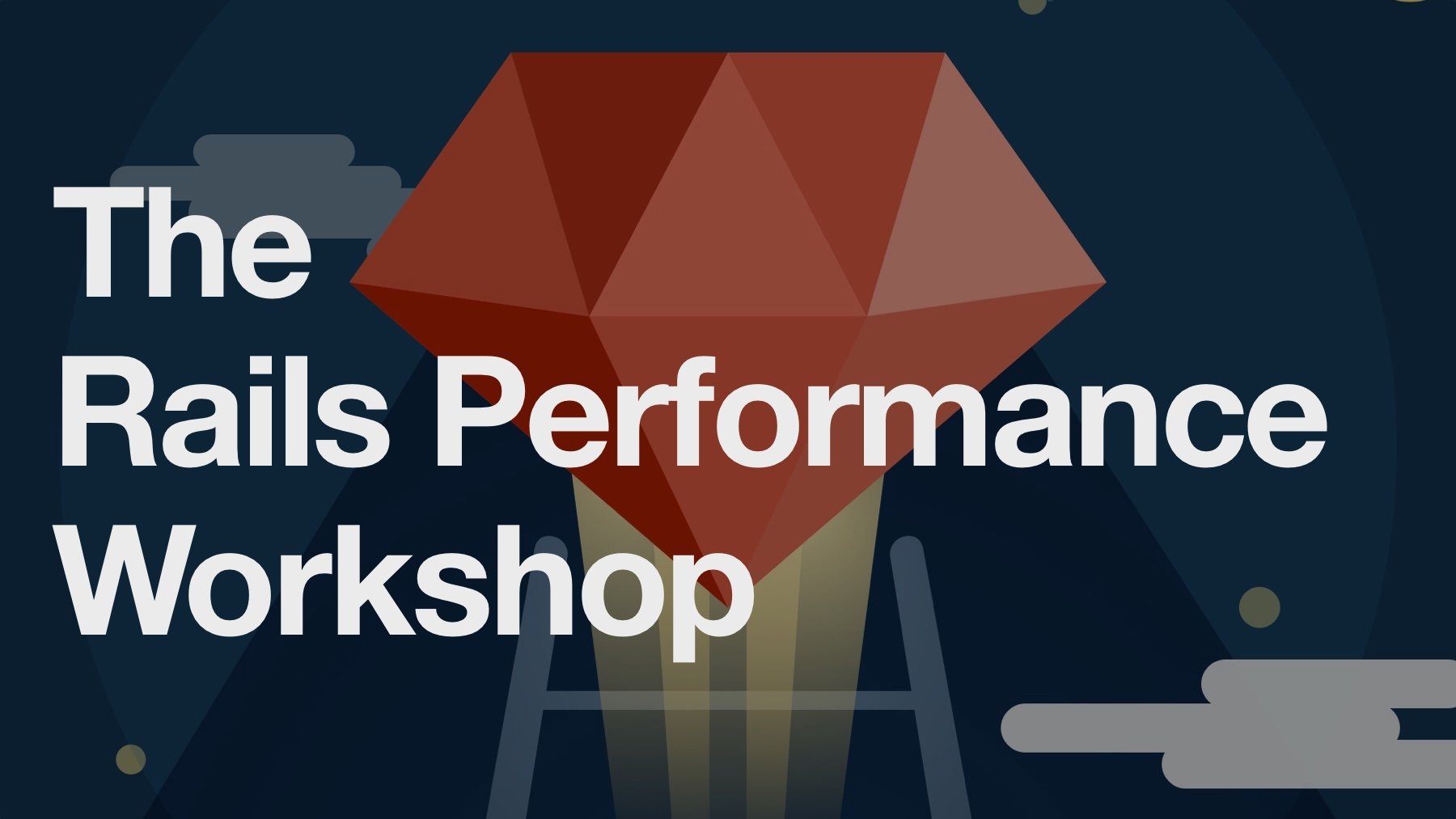
More Posts
Announcing the Rails Performance Apocrypha
I've written a new book, compiled from 4 years of my email newsletter.
We Made Puma Faster With Sleep Sort
Puma 5 is a huge major release for the project. It brings several new experimental performance features, along with tons of bugfixes and features. Let's talk about some of the most important ones.
The Practical Effects of the GVL on Scaling in Ruby
MRI Ruby's Global VM Lock: frequently mislabeled, misunderstood and maligned. Does the GVL mean that Ruby has no concurrency story or CaN'T sCaLe? To understand completely, we have to dig through Ruby's Virtual Machine, queueing theory and Amdahl's Law. Sounds simple, right?
The World Follows Power Laws: Why Premature Optimization is Bad
Programmers vaguely realize that 'premature optimization is bad'. But what is premature optimization? I'll argue that any optimization that does not come from observed measurement, usually in production, is premature, and that this fact stems from natural facts about our world. By applying an empirical mindset to performance, we can...
Why Your Rails App is Slow: Lessons Learned from 3000+ Hours of Teaching
I've taught over 200 people at live workshops, worked with dozens of clients, and thousands of readers to make their Rails apps faster. What have I learned about performance work and Rails in the process? What makes apps slow? How do we make them faster?
3 ActiveRecord Mistakes That Slow Down Rails Apps: Count, Where and Present
Many Rails developers don't understand what causes ActiveRecord to actually execute a SQL query. Let's look at three common cases: misuse of the count method, using where to select subsets, and the present? predicate. You may be causing extra queries and N+1s through the abuse of these three methods.
The Complete Guide to Rails Performance, Version 2
I've completed the 'second edition' of my course, the CGRP. What's changed since I released the course two years ago? Where do I see Rails going in the future?
A New Ruby Application Server: NGINX Unit
NGINX Inc. has just released Ruby support for their new multi-language application server, NGINX Unit. What does this mean for Ruby web applications? Should you be paying attention to NGINX Unit?
Malloc Can Double Multi-threaded Ruby Program Memory Usage
Memory fragmentation is difficult to measure and diagnose, but it can also sometimes be very easy to fix. Let's look at one source of memory fragmentation in multi-threaded CRuby programs: malloc's per-thread memory arenas.
Configuring Puma, Unicorn and Passenger for Maximum Efficiency
Application server configuration can make a major impact on the throughput and performance-per-dollar of your Ruby web application. Let's talk about the most important settings.
Is Ruby Too Slow For Web-Scale?
Choosing a new web framework or programming language for the web and wondering which to pick? Should performance enter your decision, or not?
Railsconf 2017: The Performance Update
Did you miss Railsconf 2017? Or maybe you went, but wonder if you missed something on the performance front? Let me fill you in!
Understanding Ruby GC through GC.stat
Have you ever wondered how the heck Ruby's GC works? Let's see what we can learn by reading some of the statistics it provides us in the GC.stat hash.
What HTTP/2 Means for Ruby Developers
Full HTTP/2 support for Ruby web frameworks is a long way off - but that doesn't mean you can't benefit from HTTP/2 today!
How Changing WebFonts Made Rubygems.org 10x Faster
WebFonts are awesome and here to stay. However, if used improperly, they can also impose a huge performance penalty. In this post, I explain how Rubygems.org painted 10x faster just by making a few changes to its WebFonts.
Page Weight Doesn't Matter
The total size of a webpage, measured in bytes, has little to do with its load time. Instead, increase network utilization: make your site preloader-friendly, minimize parser blocking, and start downloading resources ASAP with Resource Hints.
Hacking Your Webpage's Head Tags for Speed and Profit
One of the most important parts of any webpage's performance is the content and organization of the head element. We'll take a deep dive on some easy optimizations that can be applied to any site.
How to Measure Ruby App Performance with New Relic
New Relic is a great tool for getting the overview of the performance bottlenecks of a Ruby application. But it's pretty extensive - where do you start? What's the most important part to pay attention to?
Ludicrously Fast Page Loads - A Guide for Full-Stack Devs
Your website is slow, but the backend is fast. How do you diagnose performance issues on the frontend of your site? We'll discuss everything involved in constructing a webpage and how to profile it at sub-millisecond resolution with Chrome Timeline, Google's flamegraph-for-the-browser.
Action Cable - Friend or Foe?
Action Cable will be one of the main features of Rails 5, to be released sometime this winter. But what can Action Cable do for Rails developers? Are WebSockets really as useful as everyone says?
rack-mini-profiler - the Secret Weapon of Ruby and Rails Speed
rack-mini-profiler is a powerful Swiss army knife for Rack app performance. Measure SQL queries, memory allocation and CPU time.
Scaling Ruby Apps to 1000 Requests per Minute - A Beginner's Guide
Most "scaling" resources for Ruby apps are written by companies with hundreds of requests per second. What about scaling for the rest of us?
Make your Ruby or Rails App Faster on Heroku
Ruby apps in the memory-restrictive and randomly-routed Heroku environment don't have to be slow. Achieve <100ms server response times with the tips laid out below.
The Complete Guide to Rails Caching
Caching in a Rails app is a little bit like that one friend you sometimes have around for dinner, but should really have around more often.
How To Use Turbolinks to Make Fast Rails Apps
Is Rails dead? Can the old Ruby web framework no longer keep up in this age of "native-like" performance? Turbolinks provides one solution.
Get notified on new posts.
Straight from the author. No spam, no bullshit. Frequent email-only content.